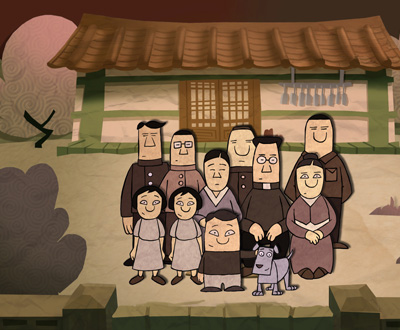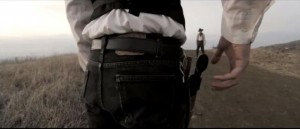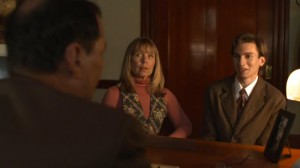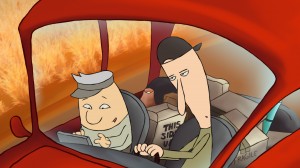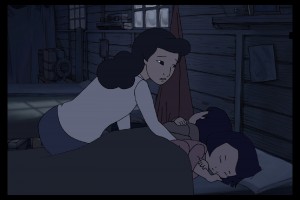San Jose State is playing a leading role in Cinequest 23, the film festival underway now through March 10 in downtown San Jose.
The films from SJSU’s radio, television and film and animation/illustration programs are definitely worth seeing, not just because they are professional quality, but also because they offer real insight into the lives of people who may be sitting right next to you in class.
Cinequest student tickets for regular movie screenings are $5 with a valid student ID, while general admission is $10. Prices vary for special events, and festival passes are also available for purchase. Want to check out films and events with ties to SJSU? Here’s more:
Students created this brief cowboy showdown for an intermediate film/TV production course taught by RTVF Professor Harry Mathias. A one-minute version is being shown before a feature-length Chinese Western movie, “An Inaccurate Memoir.”
- Mathias said this is the first SJSU student short film that will be shown outside of Cinequest’s Student Shorts collection.
- “It really is a testament to the fact that with hard work, a clear concept and a dedicated crew, you can achieve anything in the film business,” said cinematographer Shehbaz Aslam. “The fact that the short is being shown as a companion piece to ‘An Inaccurate Memoir’ is an honor in that not only will it give the short exposure, but that it will be shown before a film shot by a cinematographer I really admire, Yu Cao, whose work was part of the visual inspiration of the short.”
- Director Ricky Dellinger said the original filming location was supposed to be Bodie, a Californian ghost town located six hours away from the Bay Area. “We scouted the area and thought it was perfect, but of course due to our college student budget, we didn’t have enough money to pay the fee to film there,” he said. Instead, Montgomery Hill Park in San Jose was a stand-in for the Wild West.
Spartan Film Studios provides students with real-life filmmaking experience, according to production coordinator Barnaby Dallas and studio coordinator Nick Martinez. Some of the on-campus production company’s feature-length films have been featured at Cinequest in the past, including “All About Dad” and “Super Hero Party Clown.” The directors of these two films, in addition to Dallas and Martinez, will be part of this forum.
- A preview of Spartan Film Studios’ latest feature, “Always Learning,” will be shown at this event. This coming-of-age story is relatable to director Robert Krakower, ’11 radio-television-film, since he was homeschooled just like the main character.
- Spartan Film Studios was recently featured in the Metro’s Cinequest preview and on the front page of the San Jose Mercury News.
- In addition to cinema, Spartan Film Studios has worked on a variety of projects, including filming the 2012 Spartan football team intro, creating a SJSU commercial that aired on ESPN and participating in the Green Ninja project.
- Just like in the film, Chai went on a cross-country road trip with his father, who was in the process of writing about his life. The trip was a reminder of how none of us know what our parents went through before we were born. In Hi Dong Chai’s case, the losses were gut-wrenching, but Chai said the story is ultimately about perseverance.
- About 70 students and alumni helped with the short film last summer, including alumni who work at Dreamworks, Zynga and “American Dad.”
- This film won the gold medal in the Moving Image Category at the New York Society of Illustrators 55th Annual Exhibition, marking the first time that SJSU has earned this distinction.
- With her health worsening, Ikemoto’s grandmother began opening up about her time at Tule Lake. This inspired Ikemoto, who was looking for a short story for one of her animation classes.
- Ikemoto and student artists visited Tule Lake, but the camp had been deconstructed. Instead, the best resource came from the Japanese American Museum of San Jose where they studied replica barracks at an exhibit. They also met a museum docent who was construction director at Tule Lake and gave them access to a personal collection of photos.
- “Tule Lake” has earned multiple awards, including top prizes at the 2012 CSU Media Arts Festival and 2012 CreaTiVe Awards. It was also nominated in the student film category at the 40th Annual Annie Awards, “the highest honor given for excellence in animation,” according to its website.
Director Shohei Shiozaki, ’04 radio-television-film, makes his feature debut with this tale of a Brazilian immigrant boy Ricardo, his friend Hanako and a magical, blue goldfish. The children try to protect the fish, the reincarnated spirit of a Chinese princess, from opposing forces including the mayor and Japanese gangs.
- This Japanese film is set in Shiozaki’s hometown of Yamato Koriyama in Nara Prefecture, an area known for raising ornamental goldfish. This tradition, coupled with a desire to make a movie in his hometown with local resources, inspired the director. “I thought it might be a good idea to start writing a story about it and I tried to speak to the local people, ‘Let’s make a movie in our hometown,’” he said. “And after three years of financing and finding the support, the film finally got made.”
- Just like the character Ricardo, the young actor Takeshi Nagata is actually Japanese-Brazilian. There were more than 200 auditions among the Japanese-Brazilian community for this lead role, and Nagata, who makes his screen debut, stood out for being the funniest, Shiozaki said.
- Shiozaki took an SJSU class taught by Cinequest director and co-founder Halfdan Hussey and was a 2002 film festival intern. Because of that internship, he became acquainted with John Williams, a Welsh filmmaker based in Japan. “When I went back to Japan for summer break, I called him and eventually I was able to enter the Japanese film industry,” Shiozaki said. “He is the producer of ‘Goldfish Go Home,’ so we both came back to Cinequest after eight years of time. So … it is true that SJSU gave me all the chances and opportunity to become a filmmaker.”

